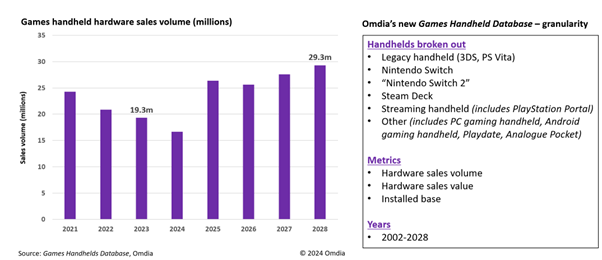
The Evolution of Handheld Gaming: From Nintendo Switch to Steam Deck
In a world where gaming has become more accessible and versatile than ever, handheld gaming devices have carved out a significant niche. Recent research from Omdia sheds light on the remarkable growth of this sector, with 19.3 million handheld gaming devices sold globally in 2023. The forecast predicts a substantial increase to 29.3 million units by 2028, reflecting a trend towards portable play that shows no signs of slowing down.
 Omdia Handheld Gaming
Omdia Handheld Gaming
The resurgence of handheld gaming can be attributed to the groundbreaking success of the Nintendo Switch, which redefined the landscape after facing stiff competition from mobile gaming in the early 2010s. Unlike its predecessors, the Switch seamlessly integrated the core elements of console gaming into a portable device, setting a new standard for the industry. This shift paved the way for innovations like the Steam Deck, launched in 2022, which replicated this success in the realm of PC gaming.
Embracing a New Era: PC Gaming Handhelds and Beyond
The Steam Deck’s triumph marked the dawn of a new product category: the PC gaming handheld. By leveraging Steam’s extensive games library, the Steam Deck demonstrated the viability of bringing PC gaming experiences to a portable platform. Inspired by this success, hardware giants such as ASUS and Lenovo have entered the fray with their own handheld offerings, expanding the options available to gamers.
Handheld gaming has also seen the rise of devices powered by streaming technology, exemplified by the PlayStation Portal. This innovative handheld extends the capabilities of the PS5 console, enabling players to enjoy their favorite titles on the go without compromising on performance. The convergence of handheld and traditional gaming platforms underscores a shift towards a more interconnected gaming ecosystem.
The Changing Landscape of Handheld Consoles
As the boundaries between handheld, PC, console, and mobile gaming blur, the industry faces new challenges and opportunities. James McWhirter, Senior Analyst at Omdia, notes that handhelds no longer exist in isolation but coexist alongside other gaming platforms. With Valve’s Steam Deck leading the charge, the importance of integrating hardware and software ecosystems has never been more apparent.
Makers of handheld gaming PCs must navigate unique hurdles distinct from those in the desktop and notebook markets. The success of these devices hinges on their ability to offer a seamless gaming experience while adapting to the evolving preferences of modern gamers. As the industry continues to evolve, the role of handheld gaming in shaping the future of interactive entertainment remains a topic of keen interest.
Forecasting the Future
Omdia’s Games Handheld Database projects a promising trajectory for dedicated handheld gaming hardware up to 2028, indicating sustained growth and innovation in this dynamic sector. With major players like PlayStation and Steam expanding their ecosystems to embrace portable play, the landscape of handheld gaming is poised for further transformation.
In conclusion, the evolution of handheld gaming from the era of Nintendo Switch to the advent of the Steam Deck exemplifies the industry’s adaptability and resilience in the face of changing consumer preferences. As technology continues to advance and gaming becomes increasingly ubiquitous, handheld devices are set to play a pivotal role in shaping the future of gaming.















